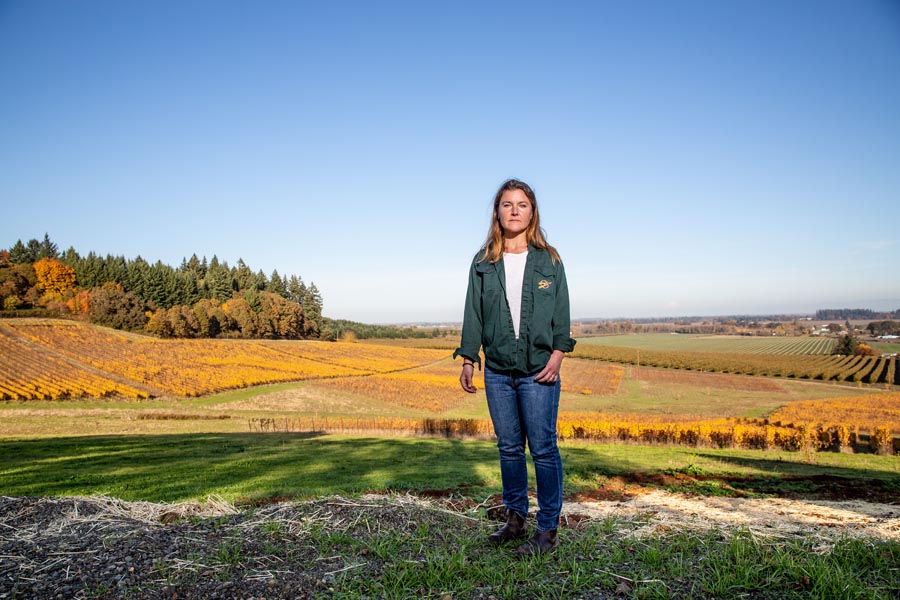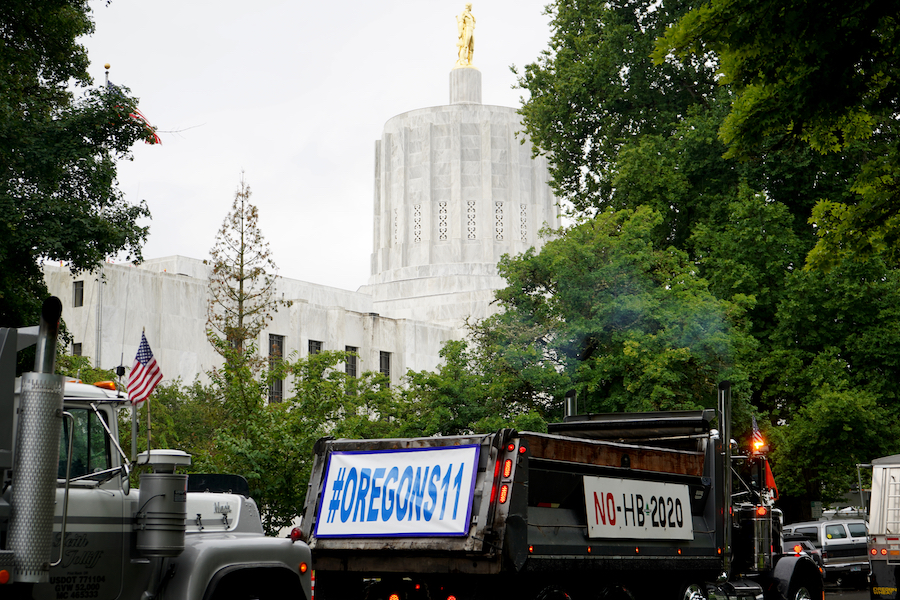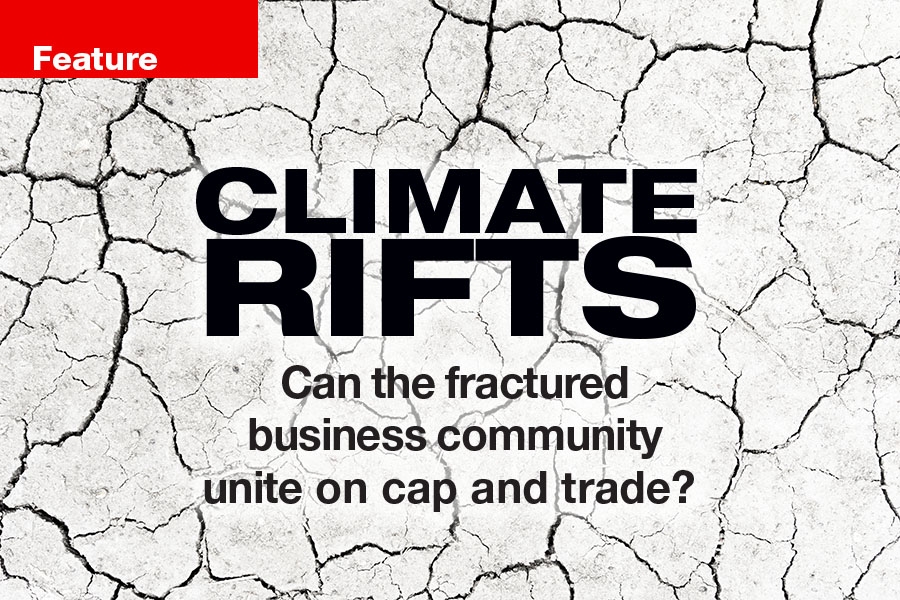Depending on whom you ask, the fight over cap and trade represents the rural-urban divide or the inability of lawmakers to compromise. The real tension, however, lies in the business community as it sorts out who pollutes, who pays and what it means to do business in Oregon.
Mimi Casteel can’t hide her passion — or her growing anxiety.
A second-generation Willamette Valley winemaker, Casteel’s parents were two of the four academics who founded Bethel Heights Vineyard in 1977. Growing up on the farm, she remembers her family’s biggest harvest anxiety: Will their cool-climate-loving pinot noir grapes ripen before the October rains set in?
Today she owns Hope Well Wine, just a few miles from Bethel Heights. After experiencing 10 of the hottest vintages in Oregon’s history and several of the driest, Casteel’s anxiety has flipped.
“Now the nail-biting part of harvest is ‘Can you pick grapes with good flavors early enough and not make a 15% alcohol pinot or have your acidity go completely out the window because it’s too hot?’” She marvels at the speed of the change. “We’ve lost the nature of a cool-climate region in a quarter of my lifetime.”
Casteel didn’t set out to be a winemaker. Her first career with the Forest Service better suited her self-described “hermit-y ways.” But there, in the woods, Casteel witnessed the effects of climate change firsthand. Saddened, alarmed and energized, she changed course.
“I saw that there was no way to save those pristine conditions without the support of the privately held land base.”
So Casteel came back to the farm, first at Bethel Heights and then with her own label to build that support. She started by committing to growing practices that rebuild the resilience of the land. She supports bold legislative steps to reduce greenhouse gases.
And, perhaps most difficult for an introvert, Casteel tries to activate the agricultural land-owning base, aka her neighbors, to do the same.
“I’ll talk to any farmer or anyone who drives a truck for a living about this,” she says, admitting that her opinions are not always welcome. “I’m getting more comfortable with being a pariah.”
 Mimi Casteel stands is shocked by the speed of warming, which impacts the quality of her pinot noir grapes. Photo: Jason Kaplan
Mimi Casteel stands is shocked by the speed of warming, which impacts the quality of her pinot noir grapes. Photo: Jason Kaplan
Casteel’s thick skin and vocal support for HB2020 set her apart from the pack as the cap-and-trade bill, which puts a price on carbon emissions, went from a sure thing earlier this year to a spectacular flameout.
Tactics to kill the bill included political theater, boycotts and bullying of supportive business owners.
Iconic Oregon manufacturers Deschutes Brewery, Dutch Bros Coffee and Fort George Brewery buckled under the pressure and publicly withdrew their support, claiming political neutrality.
But is political neutrality even possible in 2019?
Fashioning a corporate point of view is nothing new. It helps companies stand out, connect with customers and build loyalty. For Oregon businesses, linking their brand to the state’s green reputation used to make good sense.
Now, in our highly polarized, tribal environment, where taking any point of view is inherently political and risky, neutrality seems like the safe bet.
Until it’s not. Climate change already negatively affects Oregon manufacturers, from harvest anxieties and ocean acidification to wildfires and energy-grid uncertainty. Can they afford to stay neutral on a bill designed to help solve the problem?
Some version of cap and trade has been in the works in the Oregon Legislature for the past decade or so, never gaining enough traction to cross the finish line. This year, however, felt different. Democrats held a supermajority, which they took as a mandate to move aggressively on climate change.
Momentum was building after other large bills passed, such as a $1 billion a year business tax to fund schools. At this point, Oregon becoming the second state after California to adopt an economy-wide cap-and-trade system felt inevitable.
And this bill was going to be transformative. HB2020’s sweeping legislation is designed to reduce emissions by at least 45% below 1990 emissions levels by 2035 and to at least 80% below 1990 levels by 2050. It promised to spur innovation, create new industries and link Oregon to other carbon markets.
A study by Berkeley Economic Advising and Research found that it would add 2.5% to the state’s gross domestic product through 2050.
The bill’s crafters, including Sen. Michael Dembrow, tried to build a broad coalition of support by including 116 amendments to the 100-plus-page bill.
These amendments gave industry 95% of their emissions allowance permits for free as long as they were keeping up with the best available technology to reduce emissions in their industry.
The concessions seemed like enough.
“Even Oregon Business & Industry moved to a neutral position,” Sen. Dembrow says of the state’s largest business association.
(Oregon Business & Industry president and CEO Sandra McDonough was not available for comment and did not respond to an emailed list of questions. The group did provide a statement, dated June 11, urging for more changes before the bill’s final passage. The statement did not detail any of the desired changes.)
So why did it fail?
That depends on who you ask. After easily passing the House, the bill had a slim majority of support in the Senate. Sen. Dembrow and pro-cap-and-trade lobbyists blame the failure on Republican senators who fled the state, denying the necessary quorum.
“The votes were there,” insists Brad Reed, communications director for advocacy group Renew Oregon.
Others are not so sure.
“I would say they’re full of it,” says political analyst Jim Moore of those who blame the absent Republicans. He instead points to Laurie Monnes Anderson, the Democratic senator representing Gresham who flipped to a no vote in the 11th hour.
“She was pressured by Boeing,” Moore says. (Boeing operates a large manufacturing facility in her district.) “And then she did the classic thing when you have complex legislation: She didn’t read the bill.” (Anderson did not respond to an interview request or answer a list of emailed questions.)
Then came the political theater. Andrew Miller, CEO of Portland-based Stimson Lumber, called for a boycott of the coalition of businesses that make up Oregon Business for Climate, which advocates for pricing carbon emissions.
Absent Republican Senator Brian Boquist threatened to shoot any state trooper sent for him with the now infamous statement, “Send bachelors and come heavily armed.” Grassroots group #TimberUnity organized a protest with truckers and loggers driving their rigs around Salem.
And a right-wing militia group made threats credible enough to shut down the Capitol.
 Protestors opposed to House Bill 2020attend a rally at Oregon State Capitol on June 27, 2019. Photo: Dan Meyers/Shutterstock
Protestors opposed to House Bill 2020attend a rally at Oregon State Capitol on June 27, 2019. Photo: Dan Meyers/Shutterstock
While widespread violence never materialized, there was still plenty of harassment to go around, particularly for companies that signed on with Oregon Business for Climate. Owners were menaced, received threats and had their tires slashed.
It got so hot that director Nancy Hamilton took the list of supporting businesses off the website.
But not before Deschutes, Fort George and Dutch Bros withdrew, under the cover of political neutrality. “Our longstanding policy at Fort George is to not endorse specific candidates or specific pieces of legislation. We are a public house, welcoming to everyone regardless of political affiliations,” wrote Fort George representative Brad Blaser via email.
Dutch Bros did not respond to emailed questions but referred to a Twitter statement that says it is “a company dedicated to being neutral on all issues related to politics and religion.”
Deschutes Brewing, the state’s largest brewery, sent a statement through a company representative that says in part, “Our intent has always been and will continue to be to remain neutral on political issues.”
But a glance at Deschutes’ website tells a different story. It is fine piggybacking on the state’s green reputation when it writes on its sustainability page, “Our Portland staff often chooses to commute in by bike or train, because, well, it’s Portland and they’ll get their ass kicked if they drive.”
But claiming neutrality on a bill designed to transform the entire transportation sector comes across as disingenuous.
Winemaker Casteel gets it. She knows how difficult it is just to get a product to market. “People have their heads down like they never used to. You have to hustle so hard, and not many like the idea of becoming an activist in their spare time.”
Certainly HB2020’s size, complexity and lack of messaging around its benefits helped lead to its downfall. After all, it’s harder to discuss the nuance in a 100-page bill than it is to claim it will shut down mills, raise gas prices and destroy the rural way of life.
Matt King, renewable energy program coordinator at rural economic development nonprofit Wallowa Resources, explains: “Some folks on this side of the state felt personally attacked by some of the rhetoric around the bill. Whether or not that rhetoric is true is a whole other story.”
Ironically, what is true is that HB2020 was designed to benefit communities disproportionally impacted by climate change. “Rural and coastal communities are specifically called out as impacted communities,” wrote Sen. Dembrow in an email, noting that they would receive 40% of investments from a climate investment fund, and 20% of all investments go to projects in natural and working lands.
There would be direct investment in forest-health projects such as thinning and prescribed burns, which would lead to more jobs, millions dedicated to helping farmers make their equipment cleaner and much more.
In other words, money, and lots of it, was on the way.
“This was a huge missed opportunity,” says Dylan Kruse, director of government affairs and program strategy at nonprofit Sustainable Northwest, mourning the loss of “hundreds of millions of dollars in yearly investment in rural communities.”
King at Wallowa Resources — whose organization helps landowners carry out sustainable forestry, ranching and agricultural practices — is also disappointed. “We could have facilitated much more forest management, employed more people and created more of a stewardship economy.”
Oregon Business for Climate’s Hamilton agrees that rural Oregon has a lot to gain from passing HB2020. She also points to the benefits for everyone else. “Our members tell us we are already paying dearly for the impacts of climate change,” she says, pointing to increased weather volatility, health impacts and an unstable power grid.
“There is economic opportunity as we move toward a more carbon-constrained global economy.” Nancy Hamilton, director of Oregon Business For Climate
She supports the cap-and-trade model precisely because it’s a business approach. “It allows the market to decide how it’s going to respond to the regulation. There is economic opportunity as we move toward a more carbon-constrained global economy.”
The bill’s opponents see it differently.
Stimson Lumber’s Miller says HB2020’s offsets unfairly benefit his competition — timber growers on the drier, hotter east side of the state — without forcing them to innovate or change business practices. Offsets are carbon credits that emitters can use to comply with carbon-reduction targets.
Provisions in the bill allowed landowners to generate offsets by participating in sustainable farming techniques that reduce greenhouse-gas emissions.
“That’s my real dislike for the bill,” says Miller. “Cap and trade is a system ripe for abuse and cronyism where bureaucrats pick the winners and losers.”
Shaun Jillions, executive director of Oregon Manufacturers and Commerce, points to the chance of “leakage” among a number of so-called Energy-Intensive, Trade-Exposed manufacturers across the state. “Leakage…is a terrible word to replace what it actually is: plant closures,” he says via email.
“Energy-Intensive Trade-Exposed [manufacturers] compete on a national and international scale, and simply cannot pass along significant cost increases while remaining competitive in the market.”
“I don’t think we would have leakage,” counters Tom Potiowsky, director of the Northwest Economic Research Center and chair of Portland State University’s economics department. He does acknowledge that industries at the end of the supply chain such as wholesalers, retailers and construction, to some extent, would see increases in fuel costs.
A companion bill, HB3425, would have helped mitigate those fuel costs for low-income households.
But that is the point, after all. A bill that uses a market approach to reduce the combustion of fossil fuels means the price of that fuel has to go up. “We’ve been hiding these costs that affect us,” says Potiowsky. “Now we have to face them, internalize them, and yes, people will have to pay them.”
It seems like a price many Oregonians are willing to bear. While Oregon Business for Climate did lose a few members, most including Nike, The Portland Clinic, New Seasons and Hydroflask are still on board. “Our members employ just shy of 30,000 Oregonians,” says Hamilton.“We continue to represent a very big voice.”
And that voice is still loud in natural resource-based business. Sustainable Northwest’s Kruse says the landholding base supported the bill and continues to support it. “They’re on the front lines of this and feel it more than anyone else,” he says, pointing to a letter signed by more than 220 farmers, ranchers, landowners and other agribusinesses.
“They want investment revenue and resources so they can be competitive and funded for practices that are part of the solution,” says Kruse.
Miller, however, calls it a freebie, awarding taxpayer money to east side growers “for managing forests exactly how they would have anyway. That’s the dirty secret about these offset programs. They’re complicated, nobody understands them, and unless you’re an expert on the inside, there’s no way to audit them.”
“Cap and trade is a system ripe for abuse and cronyism, where bureaucrats pick the winners and losers.” Andrew Miller, CEO of Stimson Lumber
So what’s next?
The bill is destined to come back in the February 2020 short session. Sen. Dembrow and other supporters are engaging with people all over the state to build better consensus.
Gov. Kate Brown pledged to redouble efforts with “impacted industries and communities to ensure that we truly understand their concerns,” directing her carbon policy office to “work with rural manufacturers to analyze the cost and competitiveness of their industries” in a July 1 news conference.
Meanwhile, a coalition of environmental advocates has filed three aggressive ballot initiatives in a power move to pressure Senate Republicans to compromise now or face an expensive fight in November. Gov. Brown also threatened to issue an executive order to regulate emissions.
Even Stimson Lumber’s Miller seems resigned that HB2020 will pass. “My guess is that the Democrats will break enough arms to make sure it does,” he says, adding that “we’ll adapt and life goes on.”
In reality Miller stands to benefit from climate change. His coastal-range lands appear insulated from the effects so far, and he’s frankly excited about what a warmer, longer growing season will do for his Montana holdings.
“We’re going to benefit mightily there,” he says. Even wine is having a banner year with an increase in sales, revenue and production leading to an estimated value topping $200 million for the first time, according to the 2018 Oregon Vineyard and Winery Report.
Still, the whole thing feels like a black eye to Oregon’s green reputation. The state has rested on past glories, such as the Bottle Bill and the Beach Bill, for quite some time.
True, Oregon is not a big emitter of greenhouse gases compared to other states, thanks to other advances such as nonbinding climate policy passed in 1989, or a pledge from electric utilities Portland General Electric and PacifiCorp to wean off coal. But the state hasn’t come close to something as big, bold and transformative as HB2020.
Meanwhile, other states are already implementing similar policies without any big downsides. California, the first state to pass similar legislation in 2006, has not seen widespread “leakage” or exodus of heavy-emitting manufacturers. New Jersey rejoined the 10-state Regional Greenhouse Gas Initiative, a cap-and-trade program that covers the power sector, after leaving eight years ago.
HB2020 is a market-based solution to stem the effects of climate change. Adopting it could position Oregon as an environmental leader once again. No one is saying it will be easy, but that doesn’t deter Hope Well Wine’s Casteel.
“I don’t want to sound naïve, but this state has done great things in the past. We will lead again, even if it’s hard, even if it takes going down to the wire,” she says.
To subscribe to Oregon Business, click here.







